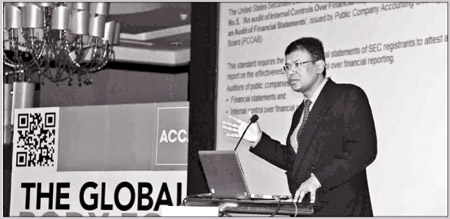ACCA holds discussion on financial reporting and controls
ACCA recently conducted a workshop on reviewing and reporting of
financial controls based on the Sarbanes-Oxley Act of 2002 a law passed
in the U.S.A. Conducted at the Cinnamon Lakeside in collaboration with
SJMS Associates and Echelon Magazine, the keynote speaker at this
occasion was Ganesh Balakrishnan from Deloitte Haskins & Sells in
Hyderabad, India. With twenty years of experience behind him and
appointed as the learning coordinator for Deloitte India on all training
competencies he is a regular speaker at the Institute of Chartered
Accountants of India .
|

Ganesh Balakrishnan |
He is attached to the IFRS faculty with the Institute for in house
and open house programmes and was a co-opted member of the Research
Committee of the Instituteís southern region for 2009/10 and of the
Auditing and Assurance Standards Board for 2010/11. In addition he is a
technical reviewer in the Quality Review Board instituted by the
Government of India and serves as a faculty for Dunn and Bradstreet for
its in house and open house programmes.
Balakrishnan commenced his address by stating that the Establishment
and Monitoring of Internal Controls enables a better communication of
the material factors that create value by being useful to various
stakeholders that include shareholders, debtors, clients, employees and
governments, in understanding a company's financial performance and
managementís stewardship of the companyís resources .
He explained that the two key components required under the
Sarbanes-Oxley Act in a financial report, are internal controls and
financial reporting. Managementís ability to fulfill its financial
reporting responsibilities depends in part on the design and
effectiveness of the processes and safeguards it has put in place over
accounting and financial reporting.
Citing areas of importance in internal controls he pointed out that
they included the Control Environment that consist of the integrity,
ethical values and competence of the entityís people, managementís
philosophy and operating style, the way management assigns authority and
responsibility, and organizes and develops its people and the attention
and direction provided by the Board of Directors.
Risk Assessment was another important factor to consider. This
includes the variety of risks faced by an entity from external and
internal sources .Risk assessment is the identification and analysis of
relevant risks for achievement of the objectives, forming a basis for
determining how the risks should be managed. Because economic, industry,
regulatory and operating conditions will continue to change, mechanisms
are needed to identify and deal with the special risks associated with
change.
He went on to say that Control Activities that are the policies and
procedures that help ensure management directives are carried out and
consist of a range of activities as diverse as approvals,
authorizations, verifications, reconciliations, reviews and operating
performance, security of assets and segregation of duties should also be
considered.
Balakrishnan further explained that another aspect to look at was
Information and Communication where pertinent information must be
identified, captured and communicated in a form and timeframe that
enable people to carry out their responsibilities. Information systems
should produce reports, containing operational, financial and compliance
reacted information that make it possible to run and control the
business and should deal with not only internally generated data, but
also information about external events, activities and conditions
necessary to informed business decision-making and external reporting
Finally there were the monitoring activities. Internal control
systems need to be monitored, a process that assesses the quality of the
systemís performance over time. This is accomplished through ongoing
monitoring activities, separate evaluations or a combination of the two. |





